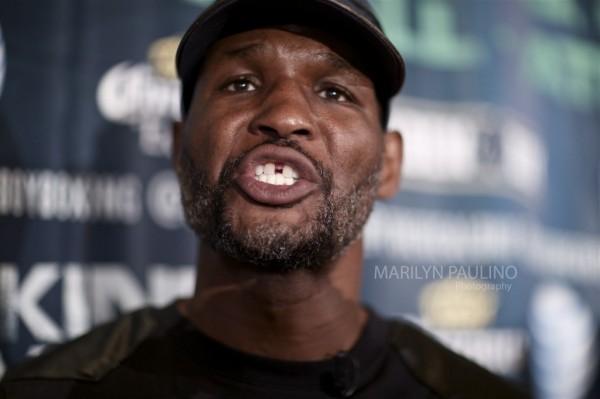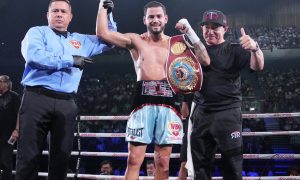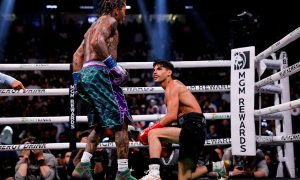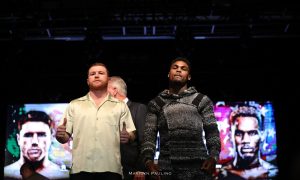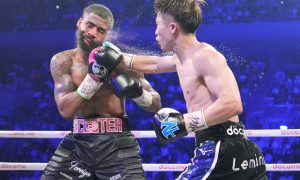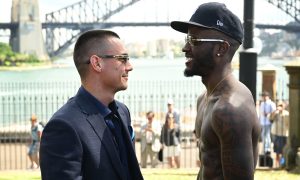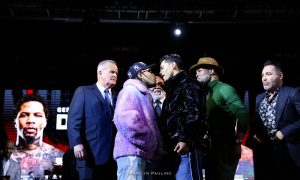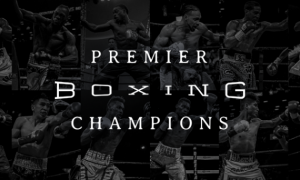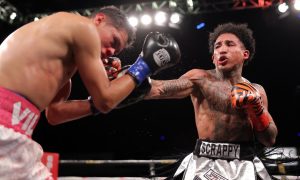The circle is now complete, the student has become the master. A classic line from George Lucas’ iconic Star Wars series. Hardly the most relevant movie, but the sentiment is perfect when describing the latest pilgrimage of the legendary Bernard Hopkins to Atlantic City on Sunday, June 23, 2019.
Hopkins recently returned to the city where his three decades in the squared circle began, this time to be inducted into the Atlantic City Boxing Hall Of Fame alongside such esteemed pugilistic company as the legendary four division champion Roberto Duran, two-time Heavyweight champ Tim Witherspoon, Iran Barkley, Micky Ward and Virgil Hill.
Each fighter carries prized moments in the heyday of Atlantic City as a boxing town, but for Hopkins (who fought there an astonishing 19 times, going 16-3 overall) it is a puzzling moment as he will complete a full circle from where he began in a way he himself never would’ve expected.
“It’s a testimony that for all athletes, no matter what sport they are in, that the way you start off isn’t necessarily the way your gonna end,” said Hopkins. “I couldn’t have written this script. This way, the timing of everything, is to me just another testimony in my history of overcoming all the odds. Personally in my life and athletically in my life, but I’m gonna say it again–I couldn’t have written this script.”
After all, the young Hopkins was by his own admission “fed to the lions” from the beginning and fought to a decision loss in his pro debut against Clinton Mitchell (a two-time golden gloves champ and prospect who was undefeated with five bouts at the time) while still on probation from serving a lengthy penitentiary sentence for attempted robbery.
Hopkins’ continued inner strength and mental fortitude would serve him well as he continued his career going undefeated for 20 fights until a loss in his first attempt at a world title came against none other than fellow great (and blue chip prospect at the time) Roy Jones Jr.
He would rebound from that loss to become undisputed Middleweight champion of the world, tying and eventually surpassing the record for consecutive title defenses set by Carlos Monzon (14 defenses) and claiming the scalps of quality future champs and contenders of the day including Oscar De La Hoya, Felix Trinidad, John David Jackson ,William Joppy, Antwon Echols and Glen Johnson.
Reflecting on the nature of his drive and how he managed to not allow any man to get in his way, Hopkins discussed the many obstacles he overcame both inside and outside of the ring.
“A lot of these guys didn’t become champions because of Bernard Hopkins. They was in my era,” said Hopking. “I stopped a lot of dreams, but I didn’t let the penitentiary stop mine, I didn’t let society stop mine, I didn’t let the powers that be in boxing stop mine. I didn’t let the naysayers stop mine, I didn’t let anybody stop my dream like others let me stop theirs.”
Hopkins’ continued success was as much a testament to self belief as it was to discipline. Hopkins maintained a spartan lifestyle in and out of camp, that combined with his dedication to remaining a student of the game and always analyzing his opponent and reinventing his style helped him best many of his younger competitors. His goal became to cement his legacy the same way he did anything his entire career; fight by fight
“[I have] memories of those six rounders, eight rounders, those championship fights, those historic fights. Moving up one division, two divisions, [Kelly] Pavlik, [Antonio] Tarver, some of my greatest fights–19 of ’em–in Atlantic City,” reflected Hopkins. “It’s a lot of fights at a top level. I couldn’t have written this. But I always understood that I wanted to put myself in a position to be remembered long after I’m gone.”
It’s a rare breed of fighter who goes into the latter years of his career and changes his style successfully. But Hopkins, being the anomaly that he was, saw the importance of taking the time to understand what would allow him to not only stay in the game, but continue to thrive.
“Even in football, running backs don’t last long do they? Because they got to run into the crowd? They’re lucky to have 10 years. Am I right or wrong,” said Hopkins. “Think of a fighter, aggressive like a Joe Frazier who gotta run to the fire and not finesse the fire. See when you don’t finesse the fire, when you volunteer to be aggressive every time you fight, people will understand you’re a car with only a forward, but no reverse. I learned how to take this car and put a reverse on it when I need to go back, or when I need to go sideways or wherever. I learned to make myself a chameleon. I learned how to say, ‘Okay this guys a little strong, but he get weak in the middle of a round.’ I had to study my opponent. I realized where their strengths and weaknesses were, but not being arrogant enough to be overconfident of their weakness.”
Hopkins firmly believed and exemplified this stance in the second act of his career after back-to-back losses to Jermain Taylor resulted in the loss of his Middleweight crown.
Reflecting on those losses, Hopkins spoke on what was going through his mind and his desire to do what the legendary Sugar Ray Robinson couldn’t.
“They said, ‘Ah Bernard’s done, finished. It’s sad, he should retire,'” said Hopkins. “I said, ‘I wanna do what Ray Robinson couldn’t do,’ since he was heat exhausted in the 15th round at Yankee Stadium. I said I’ll go up and fight at Light Heavyweight. I wanna fight Antonio Tarver.”
Hopkins moved up two weight divisions to Light Heavyweight to challenge Antonio Tarver (who was coming off of a stunning knockout victory over pound-for-pound king, Roy Jones Jr.) and gave him a boxing lesson en-route to a decision victory.
Following the Tarver fight, Hopkins would go on to dismantle and defeat Kelly Pavlik (who moved up to fight Hopkins at a catch weight of 170 pounds after beating Jermain Taylor for Hopkins’ old titles), Winky Wright and settling the score with Jones Jr.
He would go on to unify and hold a piece of the Light Heavyweight championship for the remainder of different parts of his career, facing another generation of fighters before losing his final two fights to Sergey Kovalev and Joe Smith Jr.
Hopkins would retire, but continue in what he calls the next part of his career, working in his partnership with Golden Boy Promotions and former foe Oscar De La Hoya to find and guide the next generation. Together, Hopkins and De La Hoya have put together great cards to further grow the sport and its prospects, being a promotor that helps fighters by understanding their side
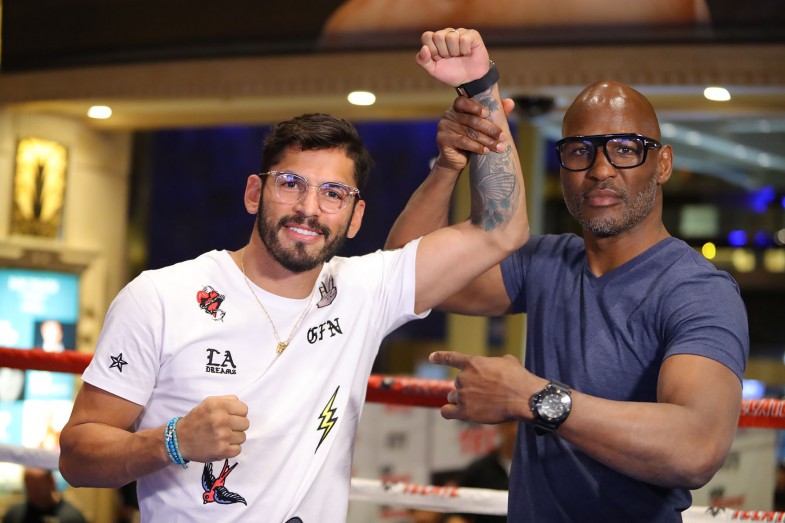
Tom Hogan/Hogan Photos/Golden Boy
“Being part of it on this side, to bring fights all around the globe, I want [fighters] to know that we got y’all back,” said Hopkins. “We know what it’s like to be in the ring and what you go through and it is what we stand for at Golden Boy Promotions.”
For Hopkins, the most memorable moment of his career has nothing to do with his accolades, belts, wins, losses or even the purses he earned. Instead, it is the words the warden spoke to him the day he left Graterford Penitentiary and the lesson it ultimately taught him.
“The day I left–with my belongings in a box–and I was leaving out with all the guys hollering at me, ‘Go be champion, bring it back for us'”, said Hopkins. “But the warden said, ‘Eh he’ll be back in six months, come on keep it moving.’ I heard that warden every time someone told me I couldn’t do something. I used it as motivation.”
Hopkins used those words as reinforcement and made them a creed.
“All I wanted to do was prove to that warden that I wasn’t coming back,” said Hopkins. “I used it as my motivation and now I tell everyone when I get the chance to speak–be careful what you tell people if you don’t want them to succeed.
Deep truths coming from a man who made his own luck and forged his own path by marching to the beat of his own drum and not allowing the cards dealt by fate fold him.
Instead, he created his own luck. And one thing remains true through all the trials of his life–Bernard Hopkins has and will continue to finesse the fire.





